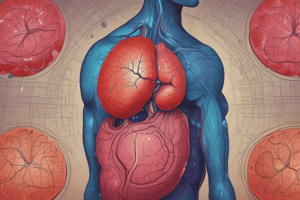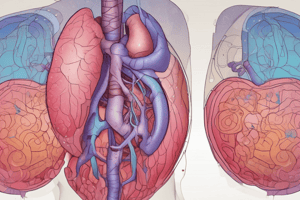Podcast
Questions and Answers
Which pathway involves the synthesis of complex molecules from simple molecules?
Which pathway involves the synthesis of complex molecules from simple molecules?
- Degradative pathway
- Oxidative pathway
- Catabolic pathway
- Anabolic pathway (correct)
What type of reactions are primarily associated with catabolism?
What type of reactions are primarily associated with catabolism?
- Acidic reactions
- Reductive reactions
- Alkaline reactions
- Oxidative reactions (correct)
Which coenzymes are primarily used in anabolism?
Which coenzymes are primarily used in anabolism?
- NAD+, NADP+, FAD
- GTP, GDP, GMP
- ATP, ADP, AMP
- NADH+H+, NADPH+H+, FADH2 (correct)
Which organic compound takes part in the control of chemical reactions necessary for cellular activity?
Which organic compound takes part in the control of chemical reactions necessary for cellular activity?
Which type of organic compound is rich in fat tissue cells?
Which type of organic compound is rich in fat tissue cells?
Which organic compound is involved in the storage, transmission, and expression of hereditary information?
Which organic compound is involved in the storage, transmission, and expression of hereditary information?
Which type of organic compound is necessary for generating energy for vital processes?
Which type of organic compound is necessary for generating energy for vital processes?
What is the main function of catabolism in the living cell?
What is the main function of catabolism in the living cell?
Which process involves the synthesis of complex molecules from simpler ones, with the consumption of energy?
Which process involves the synthesis of complex molecules from simpler ones, with the consumption of energy?
What is the role of ATP in the metabolic pathways?
What is the role of ATP in the metabolic pathways?
Which type of metabolism involves extracellular transformations of materials on their way to uptake and excretion from the cells?
Which type of metabolism involves extracellular transformations of materials on their way to uptake and excretion from the cells?
Flashcards are hidden until you start studying
Study Notes
Metabolic Pathways
- Anabolism involves the synthesis of complex molecules from simple molecules, requiring energy.
- Catabolism primarily involves decomposition reactions, breaking down complex molecules into simpler ones, releasing energy.
Coenzymes and Cellular Activity
- NAD+ and FAD are primarily used in anabolism, facilitating the synthesis of complex molecules.
- ATP (Adenosine Triphosphate) is an organic compound involved in the control of chemical reactions necessary for cellular activity.
Organic Compounds and Their Functions
- Lipids are rich in fat tissue cells, storing energy.
- Nucleic acids (DNA and RNA) are involved in the storage, transmission, and expression of hereditary information.
- Carbohydrates are necessary for generating energy for vital processes.
Catabolism and Energy
- The main function of catabolism in the living cell is to break down complex molecules to release energy.
- Anabolism involves the synthesis of complex molecules from simpler ones, with the consumption of energy.
ATP and Metabolic Pathways
- ATP plays a crucial role in metabolic pathways, serving as the energy currency for cellular processes.
Extracellular Metabolism
- Exometabolism involves extracellular transformations of materials on their way to uptake and excretion from the cells.
Studying That Suits You
Use AI to generate personalized quizzes and flashcards to suit your learning preferences.




